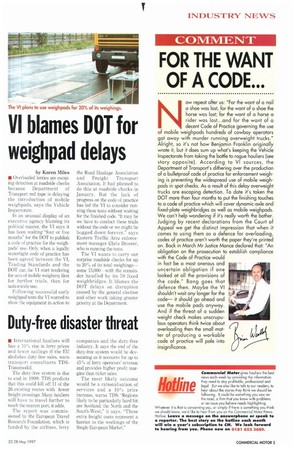FOR THE WANT OF A CODE...
Page 7

If you've noticed an error in this article please click here to report it so we can fix it.
ow repeat after us: "For the want of a nail a shoe was lost, for the want of a shoe the horse was lost; for the want of a horse a rider was lost.. .and for the want of a decent Code of Practice governing the use of mobile weighpads hundreds of cowboy operators got away with murder running overweight trucks." Alright, so it's not how Benjamin Franklin originally wrote it, but it does sum up what's keeping the Vehicle Inspectorate from taking the battle to rogue hauliers (see story opposite). According to VI sources, the Deportment of Transport's dithering over the production of a bulletproof code of practice for enforcement weighing is preventing the widespread use of mobile weighpads in spot checks. As a result of this delay overweight trucks are escaping detection. To date it's taken the DOT more than four months to put the finishing touches to a code of practice which will cover dynamic-axle and fixed-plate weighbridges as well as mobile weighpads. We can't help wondering if it's really worth the bother. Judging by recent declarations from the Court of Appeal we get the distinct impression that when it comes to using them as a defence for overloading, codes of practice aren't worth the paper they're printed on. Back in March Mr Justice Mance declared that: "An obligation on the prosecution to establish compliance with the Code of Practice would in fact be a most onerous and uncertain obligation if one looked at all the provisions of the code." Bang goes that defence then. Maybe the VI shouldn't wait any longer for the code— it should go ahead and use the mobile pads anyway. And if the threat of a sudden weight check makes unscrupulous operators think twice about overloading then the small matter of producing a workable code of practice will pale into insignificance.
















































































































